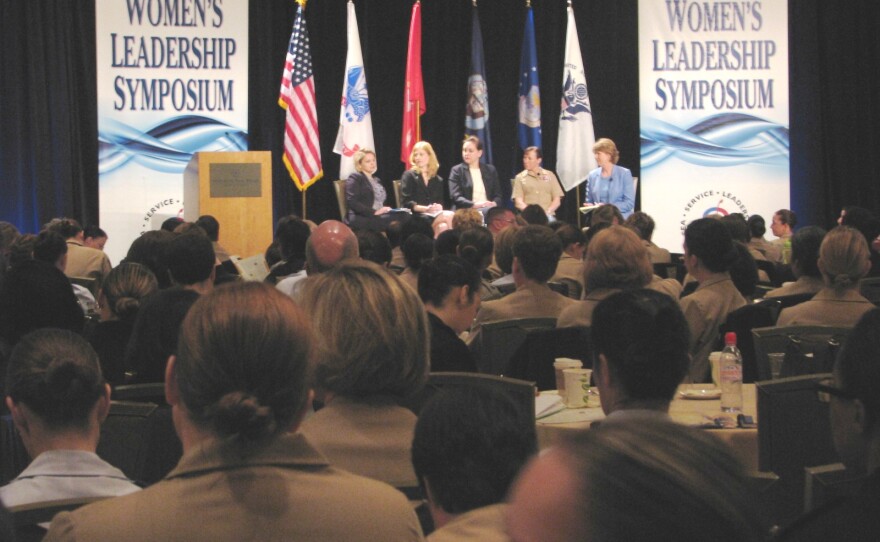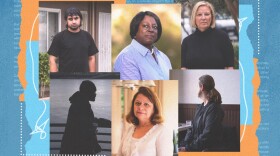This week, San Diego is hosting the Nation’s largest gathering of women in uniform. More than a thousand woman from all branches of the armed forces are meeting to talk about leadership.
It was the last question posed at the plenary session of the conference, but Donna MacLear, an army veteran, got to the heart of the Catch-22 for women in the military: They can’t rise through the ranks like a man without combat experience, but most combat roles are off limits for them.
“The combat-exclusion rule hinders promotion,” she said. "So right now, we are excluding half our population from having that place at the table.”
Speakers at the conference pointed out that 20 percent of new recruits in the military are women. Women make up 14 percent of the active-duty force and more than 17 percent of the reserves.
Tammy Duckworth is Assistant Secretary of Public Affairs at the Department of Veterans Affairs. She was also a Black Hawk helicopter pilot in Iraq and lost both legs when her aircraft was hit by a rocket-propelled grenade, north of Baghdad. To Duckworth, the issue of whether women can serve in combat is semantic.
“Women are already serving in combat,” she said. “I didn’t lose my legs in a bar fight, I lost my legs in combat. You talk to the troops on the ground and serving side by side -- it’s really a moot point. What we need to talk about is how can we serve together and make sure there are the same opportunities for leadership for women as there are for men.”
Keynote speaker Melanne Verveer was chief of staff to Hillary Clinton when Clinton was First Lady and is now Ambassador at Large for Global Women’s Issues. She says a turning point for women was Resolution 1325 passed by the United Nations Security Council a decade ago. It recognized women’s role in peace negotiations and in post-conflict reconstruction, and began to change attitudes.
“Not only in how we think about women as agents of peace and stability,” Verveer said, “but how we support their efforts. Every time I go to Afghanistan I meet with some of our military women, and they are on the front lines of making this kind of change happen.”
One of those women is Marine Lt. Col. Julie Nethercot from Camp Pendleton. She spent a year in Afghanistan doing outreach in local communities. To her surprise, she said, the Afghan men opened up to the female Marines on her team as much as the Afghan women did.
“That really was a game changer,” she said, “It was a dynamic that we didn’t understand when we were back in Pendleton in training because we were focusing on how to engage the women. But what we found is engaging the men and the children opened that window as well. The Afghan men were much more willing to engage the female-engagement teams. ...”
Nethercot said building trust with Afghan women is key to progress being made in the region. When women get educated and employed, she said, it affects their husbands and children, and women are pushing for change.
“They’ve gone from the superficial, ‘How are you? What are you doing here? Wow! Female Marine!’ to ‘How can you help me start a small business so I can provide an income for my family.’”
Ambassador Verveer said there’s also strong evidence that governments improve when women play a role.
“A World Bank study found that where the influence of women in public life is greater, the level of corruption is lower.”
Carla Coppell works with women in areas of conflict. She’s Director of the Initiative for Inclusive Security, a private philanthropic organization that supports women’s participation in promoting peace. She says progress on that front is slow in Iraq.
“Women today have a set-aside of 25 percent participation in the parliament there,” she said, “but they have been heavily marginalized. It’s really hard and some of the foremost Iraqi women leaders that I know have opted out. They’ve said that the system right now is riddled with corruption and they want to wait for their time to come back, and that’s extremely unfortunate. “
As the U.S. prepares to scale down troops in Afghanistan, Ambassador Verveer said, non-combat roles in the military will become critical.
“This kind of role is absolutely significant to the work we’re trying to do to bring an end to the conflict,” she said, “So yes, it is about waging peace, it’s about security, and women like the women here have an absolutely critical role to play in all of it.”
This was the 24th year of the Joint Women’s Leadership Symposium and the first year that women from all branches of the armed forces have attended.






